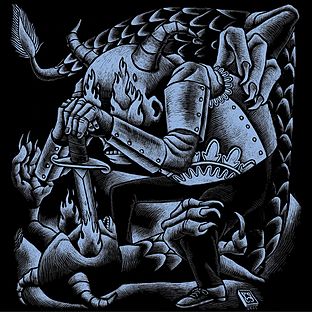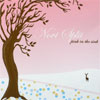
Here at A Better Offer, we strive to give you the most complete coverage of the best music availiable. As you know we are midway through our coverage of the Rosebuds--we've got a whole other week to go. And now Kelly and Ivan have been so kind as to answer a few questions that we sent them about their music and their new record,
"Night of the Furies." Enjoy!
ABO: Tell our readers a little bit about how The Rosebuds came to be.
A: Ivan was writing songs and playing the guitar and I was in an all-female performance group and just doing some stage acting stuff and he booked us a show at a local venue and then told me that we had a show later that night. I’d never been in a band but I wasn’t afraid of being on stage so I agreed. So he showed me some songs he’d written and we worked out a five-song setlist for later that night. We drove down there and hung up some Christmas lights, plugged in our Sears drum machine, and gave some girl in the audience a tambourine and just started playing. Everybody liked it and said that we should play again the next week so we said yes. The next week we played and when we finished this guy came up to me and said, “Man, you guys are fucking great! How long have you been playing!?” And I said, “It’s our second show.” So we got asked to play again and at the third show, we had our own audience. Some people even brought their own merch. One guy made T-shirts for us to sell and somebody made some stickers. The sound man taped the show and we started selling that to people who wanted to buy the record. So that’s how it started. We just kept playing and eventually Merge heard about us and when we sent them a demo in the mail, they invited us to put it out.
ABO: We’ve posted information about the creation of “Night of the Furies,” from the Merge website, but can you talk specifically about how this record was made and how that was different from how your previous records were made.
A: It’s different in that we produced it ourselves and so that gave us all the freedom in the world to do anything we wanted. That was everything. That’s what made “Furies” what it is—just having personal and creative freedom to do anything.
ABO: What about the change in sound... Was that a direct result of the inspiration for this record? If so is it a direction you see your band continuing to go?
A: We were playing a song live that was a garage-style, rave-up, rock n roll song and when we tried to get a version on tape, we weren’t happy with the way it was sounding. But we didn’t want to just kill the song so we went home and Ivan worked up a smoother version of the song, slower tempo and the same chords, and was singing the same lyrics until he accidentally went into this other thing, vocally, and then he listened back and decided to scrap most everything except that other little vocal thing. And the vocal thing was, “learn to forget” which became the first step into the song “Night of the Furies.” But it was still a smooth song—same vibe as the new demo of the old rave-up. So he added a bass to that, which is the first time we’ve ever had a bass that carried it’s own melody and just adding that bass is how the new sound was born.
ABO: What role do the three Roman goddesses (especially Tisiphone) play in this record? And how much did she affect the man who was charged with singing these stories? Are there specific points that they come out in the record? Or are they just consistently part of the songs?
A: There are so many things we were thinking about and writing about—heavy ideas and subject matter—that the Furies became a way for us to address these ideas lyrically. I’d like people to look back at us in 50 years and appreciate the music, but also the stories we tell and the style in which we tell them. The use of the Furies as a metaphor for political topics, life experiences, philosophical positions—all that stuff—protects us from sounding too prosaic. In other words, employing the Furies figuratively gave us a similar kind of freedom that the self-production step gave us. Concretely, however, the Furies are their own amazing story and we wanted to explore them for a while. If there’s ever been a time in the history of man-kind that we’ve needed the Furies, it’s now.
ABO: What about the live show…What can your fans expect to see on this tour? How many musicians will be part of your touring band, and how will the set list play out…and if this has changed at all from previous tours.
A: We are a five-piece band now. We played some shows with Yo La Tengo, then we went to Russia for a festival, and then we went to SxSW with this line-up and the response is like old times again—people see us now and like it in that way that makes them want to help us somehow. For example, we played at SxSW and so many writers saw us and then started writing about our shows and keeping up with us. And we realize how much that helps us but what the kick-ass part of it all is, it’s all DIY—they want to help and don’t expect anything for it. Unlike traditional/major print magazines and traditional media that rely on advertising and “one hand washes the other” dealings, these blogs and online magazines don’t give a shit about that—they just say what they want and what they really believe. Well, you know what I mean. So, even though we can’t buy all that traditional advertising (like bands on major labels can) and get the benefits of that exposure, we mean something real to real fucking people and it helps us more than all that other stuff anyway.
ABO: The first single, Get Up Get Out, is dancy and dark all at the same time (which is certainly a theme that runs through the new record). Can you talk a little bit about this track and how you go about choosing a single on such a conceptual album?
A: We were surprised to find a handful of early reviewers not acknowledging the darkness and heaviness of this song. And the others too. Writers who don’t understand metaphor. Or writers who don’t pay attention to lyrics. Baffling. But there is that darkness, like you say, amid the danceable music. Our last record dabbled in that as well. But for “Get Up Get Out,” we mean for it to be political and heavy but we don’t want to just write protest songs that have no hooks. Who gives a shit about that? We think, if you have a message you want people to care about, all the better if the song it lives in is good. There is a lot of beauty in things that are true—even if that truth is disturbing.














